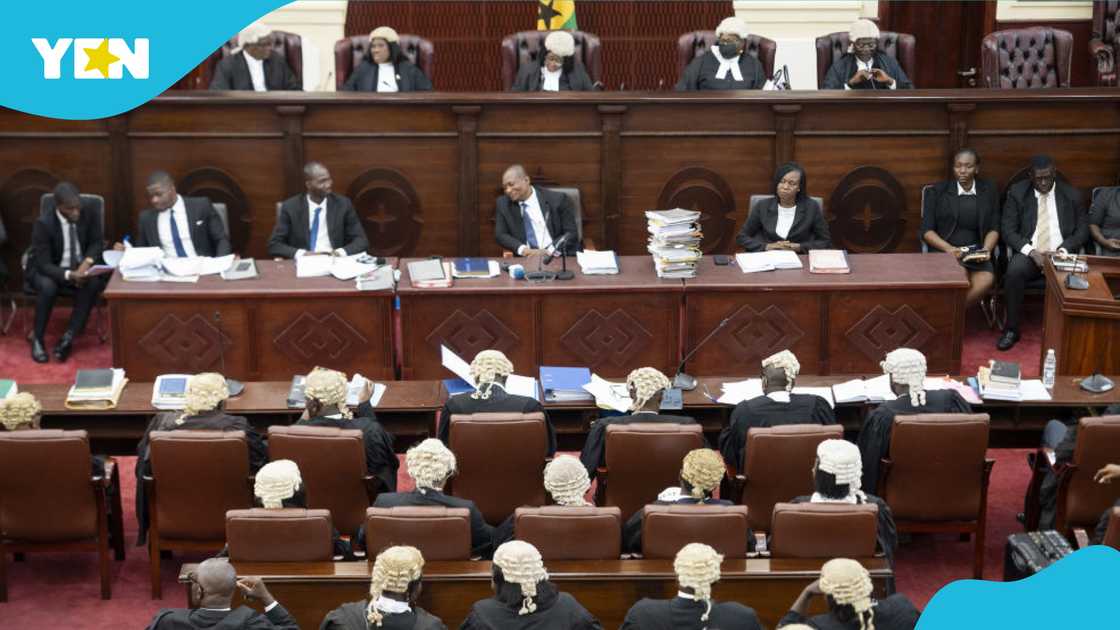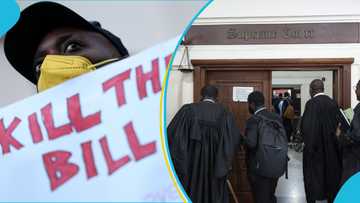Supreme Court’s Handling Of The Vacant Seats Case Feeds Into Eroding Credibility Of The Judiciary
Concerns are rife that the Supreme Court is chipping away at the judiciary's credibility with its contentious handling of political cases
Ghana’s judiciary has faced growing criticism of its credibility under the Akufo-Addo administration. In the aftermath of September’s anti-galamsey protests, questions were raised about the denial of bail to peaceful protestors.
Most recently, the Supreme Court’s handling of the challenge to the Speaker of Parliament declaring four seats vacant entrenched perceptions that the courts are not to be trusted.

Source: Getty Images
According to a 2024 Afrobarometer survey, 62% of Ghanaians have little or no trust in courts. This is more than double the 30% recorded in 2005.
For Timothy Selikem Donkor, a lawyer and activist, the trajectory of the declining confidence in the courts hearkens back to the Ghana Bar Association’s boycott of the Tribunal system under the Jerry Rawlings Junta in 1982.
Buried in the furore surrounding the vacant seat case was the Speaker of Parliament, Alban Bagbin, basically boycotting the case by not offering a defence.
“It is appropriate that the hearing shouldn’t have been concluded without the input of the speaker’s lawyer,” Donkor told YEN.com.gh.
“The fact that a whole speaker of parliament’s lawyer was absent from court is a demonstration of this and a time may come that even lawyers may not be willing to appear in court.”
The majority side was challenging Bagbin in court ostensibly because he had stripped the government of its control in Parliament by declaring four seats vacant.
Three of the affected legislators support the New Patriotic Party (NPP), while the other is from the opposition National Democratic Congress (NDC). The affected legislators were contesting the upcoming election on tickets that were different from the ones they had entered the current Parliament with.
Needless intervention by the Supreme Court?
Bagbin based his ruling on a 2020 precedent set by his predecessor, Mike Oquaye. He argued that the four MPs had violated Article 97(1) of Ghana’s 1992 Constitution. There was no legal challenge at the time.
The declaration of vacancies sparked an impasse in parliament, with NDC MPs claiming the Majority in Parliament and NPP MPs boycotting. This ultimately led to Parliament being unable to meet.
Following this, the Supreme Court's quick mobilisation to handle the impasse with a level of urgency not seen with other cases of public interest was a red flag.
As far as the ruling in the case is concerned, the Supreme Court declared that an MP's seat can only be vacated if they change their political identity and remain in Parliament under the new identity.
Another problem flagged in the saga related to whether the apex court was the correct place to hear the case and whether the constitutional provision in question needed interpreting.
“If you peruse Article 97 (G), it is very clear on the face of it that the words do not lend itself to any ambiguity at all or any sort of equivocation warranting a constitutional interpretation.”
Providing further perspective, the head of legal with the Economic Fighters League, Abena Awuku-Larbi, stressed that the high court should have taken precedence over the Supreme Court in hearing the case. Lovelace Johnson, a Supreme Court justice who sat on the case, also made this point.
“The Constitution grants exclusive original jurisdiction to the Supreme Court in specific matters but also confers concurrent jurisdiction to the High Court in cases like determining parliamentary seat vacancies,” observed Awuku-Larbi.
She also noted vital concerns in the process that mirror some grievances the Ghana Bar Association held when it boycotted the tribunals under the Provisional National Defense Council.
There would be no appeals, and parties would essentially be robbed of a 'crucial safeguard against errors', as Awuku-Larbi put it.
Glaring inconsistencies from the Supreme Court
For most observers, it is hard to look past the fact that the Supreme Court ruling ultimately benefited the government and maintained its interests in a Parliament that many Ghanaians feel has underwhelmed.
Other critical cases concerning the constitution did not get the urgent attention many who expect accountability would have hoped for.
For example, the Supreme Court ruled that President Nana Akufo-Addo breached the 1992 Constitution when he essentially sacked the then-Auditor-General, Daniel Yaw Domelevo, by forcing him to proceed on leave in 2020.
The problem with that ruling is that it came three years after it was first brought to the Supreme Court. In contrast, it only took the court a day to counter Bagbin’s declaration of the seats being vacant. The final judgment on the matter came within a month.
In his analysis of the case, Enoch Randy Aikins, a researcher with the Institute of Security Studies, noted that these inconsistencies deepen mistrust and 'drive the perception that courts are doing the executive’s bidding'.
Regardless of what people feel about the outcome of the case of the vacant seats, Donkor stressed that how a case is handled is just as critical as the final judgement when influencing the evidently declining confidence in the courts.
The lawyer believes this is a massive cause for concern.
“You cannot tell citizens that they should simply believe in courts,” said Donkor. “The authority of the judiciary is guaranteed by perception.”
Source: YEN.com.gh




